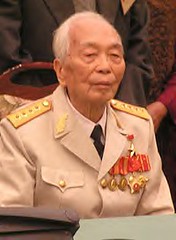
General Vo Nguyen Giap of the Vietnam People's Army has recently celebrated his 97th birthday. General Giap, a revolutionary journalist and military tactician, is respected throughout the world.
Originally uploaded by Pan-African News Wire File Photos
02:23 Mecca time, 23:23 GMT
New battle for old Vietnam soldier
By Tom Fawthrop in Hanoi
Bauxite critics say the mining would ruin the rich eco-tourism potential of the highlands
Fifty-five years after masterminding a military victory that led to the end of French colonial rule in Indochina, Vietnam's celebrated General Vo Nguyen Giap is still fighting.
The 98-year-old's latest battle - with words rather than bullets - is to save the environment and his "enemy" is bauxite mining.
In its quest for rapid economic development, Vietnam's government has committed to mining an estimated 5.3 billion tonnes of bauxite, the main ore in aluminium, most of it located in the Central Highlands province of Dak Nong.
Giap, who orchestrated the historic defeat of the French army at Dien Bien Phu on May 7, 1954, has called on the Vietnamese government to halt those plans, citing environmental damage, harm to ethnic minorities, and a threat to national security as reasons.
The man who led North Vietnamese forces against the US in the Vietnam War has written two open letters - the latest just last month - against the government's bauxite plans, and his stand appears to have inspired others.
In a rare expression of public opposition in the one-party communist country, 135 intellectuals and scientists signed a petition that was delivered to the president of the national assembly in Hanoi.
They called on the government to stop further development of new bauxite projects in the Central Highlands until a proper investigation of the environmental impact is completed.
Nguyen Tan Dung, the prime minister, has called bauxite mining "a major policy of the party and the state" and says the projects will go ahead while environmental issues are addressed.
But according to Professor Vo Quy, one of the country's foremost environmentalists, "damage to the environment far outweighs any economic benefits".
"I support economic development, but not bauxite mines," he told Al Jazeera, adding that the Central Highlands was an "area of stunning beauty with rich eco-tourism potential and a highly productive agricultural zone".
Fallout fears
Bauxite extraction produces thousands of tonnes of toxic waste known as "red sludge" according to Quy and other experts.
Vietnam's fledgling environmental movement fears the toxic residue could poison rivers that flow into heavily populated areas, including the vital Mekong Delta in the south - home to fish farms and some of Vietnam's most productive rice paddies.
In his letters, Giap called on scientists, managers and social activists to "suggest to the party and the state to have a sound policy on the bauxite projects in the Central Highlands".
"It is also my opinion that we shouldn't exploit the bauxite. The exploitation will cause serious consequences on the environment, society and national defence," he wrote.
The general also cited a 1980s report that warned the government that exploiting bauxite in the region "would cause devastating, long-term ecological damage, not only for local residents, but would also harm the lives and environment of people in the southern plains of the central provinces".
Contract signed
Despite pressure from the general, the government has gone ahead and signed a contract with a subsidiary of Chinese aluminium firm Chinalco to mine bauxite in the highlands.
But it did organise a two-day seminar in Hanoi last month for scientists to discuss how to minimise damage to the environment from bauxite mining.
And it said that the Chinese bauxite project would be reduced in scale, with restrictions placed on the numbers of Chinese workers.
Critics had complained that having thousands of Chinese mine workers in the strategic Central Highlands was an unacceptable security threat, given Vietnam's long history of conflict with its northern neighbour.
Nguyen Thien, a Vietnamese writer says the project "is all so illogical and irrational that many people suspect it is a part of a secret deal between Vietnam and China with strategic implications".
Still others say that bauxite mining is not even commercially viable since it requires a lot of water and electricity – commodities often in short supply in Vietnam.
Professor Dao Cong Tien, a former president of Ho Chi Minh City's Economics University, says the mining was likely to result in a water shortage which would severely affect Central Highlands agricultural producers.
Nguyen Huu Ninh, a Nobel Prize winner for his work on climate change, questions whether bauxite projects benefit the nation.
"There is no sense in a project that does not bring benefits to local people," he says.
But despite the doubts and objections, the government has said that the bauxite project will go ahead.
For Giap, the general who has triumphed in wars of resistance against French, and later US forces, the battle to protect the forests and rivers of the Central Highlands from the encroachments of Chinese economic may prove to be his toughest yet.
Source: Al Jazeera
No comments:
Post a Comment